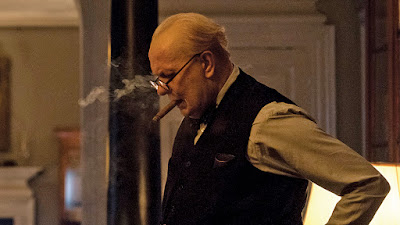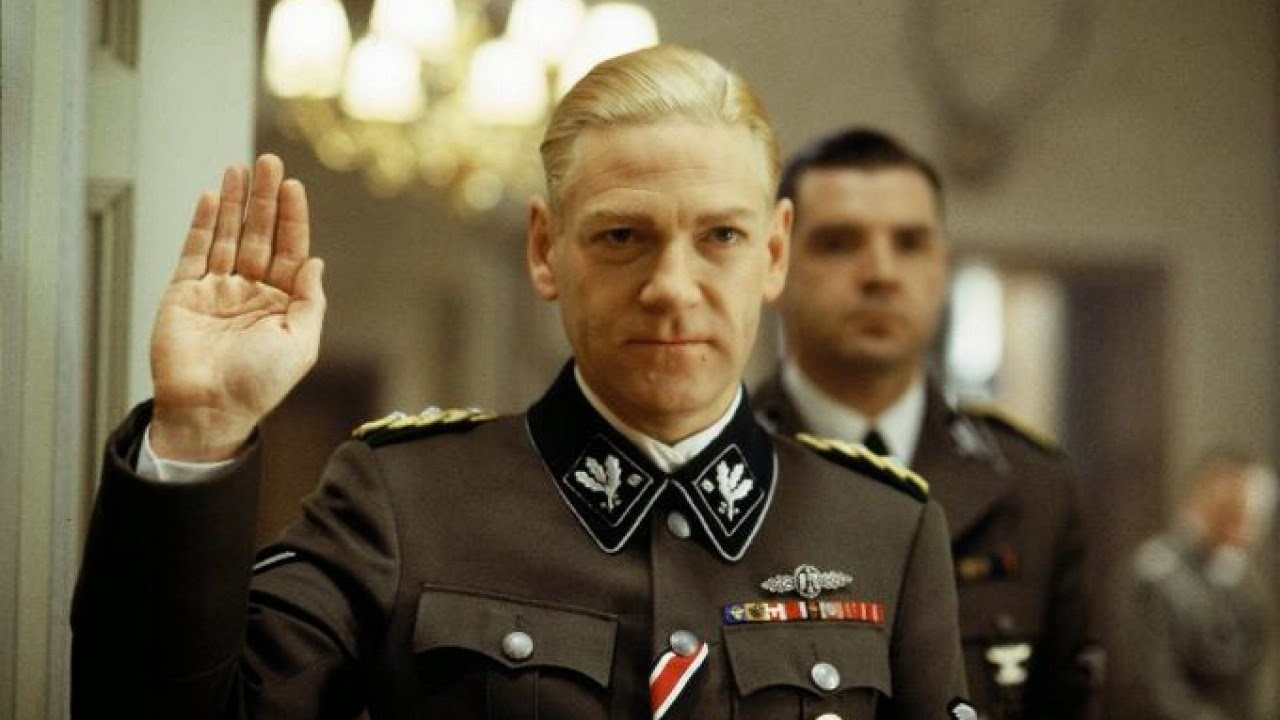My first encounter with the versatile Gary Oldman originates from the age of 12, during a home viewing of “Bram Stoker’s Dracula,” where I first gazed at the eyes of a man with an unmistakable magnetism. His was the first figure to emerge on the screen, and somehow it had a disarming quality; a handsome and approachable face, full of plausible romantic longings, felt decidedly against the type we expected of a conventional villain. After he disappeared following the prologue, my mind raced with some sense of wonder – who was he? Could we come to see him as a negative force, as the story would ultimately require? And how could any woman, however fearful of his curse, find the strength to overcome his desirable advances, however dangerous? Only much later was it pointed out to me that the old man standing in his place during the film’s first act was the same Oldman, caked in heavy makeup to appear as a 300-year-old count in the shadows of Transylvanian architecture (different actors were cast all the time to play older versions of others, I figured). It was a testament to his ability that he was able to create a great enough illusion to fool even me, and over the years I have consciously followed him with the enthusiasm of a fanatic, curious as to what may come next in his life of relentless skin-shedding.
Showing posts with label WORLD WAR II. Show all posts
Showing posts with label WORLD WAR II. Show all posts
Tuesday, February 6, 2018
Sunday, May 8, 2016
Son of Saul / **** (2015)
The sad and disquieting holocaust tragedy “Son of Saul” compels us to ponder a myriad of difficult questions, but none greater than this: what is it about a person’s face that gives a movie such decisive emotional meaning? The great Ingmar Bergman believed expressions were the passage to one’s very soul – a device that mirrored the pain and confusion of the human experience – and his movie camera frequently studied them as a means in dealing with agonizing moral complexities. If that doctrine rings true in the minds of more modern thinkers, then it is little wonder László Nemes, the impassioned Hungarian filmmaker behind this endeavor, carved his picture in the image of that sentiment. This isn’t a straightforward retelling of one man’s struggle in the hell of a Nazi concentration camp, as a reading of the premise would suggest – it is an observation of behavior that is dictated by a terrifying pattern of military orders, murder and persecution, and how one’s endurance can reduce such realities to a blur of confusion when the hope for a good deed lingers beyond the line of sight of an unending massacre.
Saturday, March 12, 2016
Triumph of the Will (1934)
Among the hundreds of endeavors of the 20th century that helped define the intricate language of cinema, two in particular were made from the fuel of dangerous personal ideologies. The first was D.W. Griffith’s “The Birth of a Nation,” and the second was Leni Riefenstahl’s “Triumph of the Will.” Both movies represented a time when historical doctrines could (and often did) disrupt the social progress of their audiences, and yet through them a few of the most revolutionary technical achievements were realized – some that would even go on to set the tone for nearly all filmmakers that were to follow. But to watch them now and regard their aesthetic triumphs is to struggle with the context in which they are used, sometimes to an end that creates alarming moral uncertainty. Can we suspend that which we are at odds with for the sake of admiring the indelible techniques that were born from their ambitious frames, or must we, indeed, consider art as an impossible measure when it is done in the provision of evil deeds?
Sunday, January 31, 2016
Lessons from Criterion:
"Ivan's Childhood" by Andrei Tarkovsky
Had the debut feature of Andrei Tarkovsky been merely regarded as one of the first of many critical essays about the impact of war on the innocence of youth, it certainly would have been enough. But “Ivan’s Childhood,” one of the saddest and most honest tragedies ever to come out of Russia, rose above even those standards – it was the caveat of the profound possibilities of eastern cinema, effectively heralding the discovery of one of the most perceptive minds to ever stand behind a movie camera. While the very concept of war films was certainly nothing new to industries overseas – especially given that most countries could only reach wide distribution by dealing with such material – seldom had they been devised under the weight of such heartbreaking humanity, or in the space of impeccable artistry. Before his undertaking, the genre had mostly been dominated by the onslaught of propaganda agendas, or movies about the strategy of the act; more routinely they were crude excursions, cut together like sensationalist news reels. But after his audacious foray into the most unfortunate reaches of the victim pool, perceptions changed so intensely that it paved the way for nearly all anti-war films that would follow. Rare is it for any single achievement to drive the hands of the cultural zeitgeist, and even more elusive is the realization that so much of today’s standard still rests firmly on any single achievement.
Tuesday, April 7, 2015
The Imitation Game / ***1/2 (2014)
“Sometimes it is the people who no one imagines anything of who do the things that no one can imagine.”
When Alan Turing demands in an early voice-over that we “pay attention” to what we are about to see, it is less a plea to notate intricate details and more a statement on the behavior we come to witness. This is not a man marching to the beat of any traditional drummer. Much of that is clear from a key interaction with one of the first human faces he engages with; during a closed-door interview with a military commander seeking cryptologists for a classified mission, dialogue contrasts personalities working from two opposing engines. It is not as obvious to Denniston (Charles Dance) that Alan is communicating from within altering mental patterns, but of course it isn’t: human psychology seemed like a fantasy to the populace of the 1930s, and poor Mr. Turning’s brilliant mind could hardly conceal him from the baffling dismissals of more socially mainstream observers. But most significant history hardly rests on the laurels of the common either, because if it did there would be scarcely a reason to contemplate our own place in a world built on the successes of outcasts.
When Alan Turing demands in an early voice-over that we “pay attention” to what we are about to see, it is less a plea to notate intricate details and more a statement on the behavior we come to witness. This is not a man marching to the beat of any traditional drummer. Much of that is clear from a key interaction with one of the first human faces he engages with; during a closed-door interview with a military commander seeking cryptologists for a classified mission, dialogue contrasts personalities working from two opposing engines. It is not as obvious to Denniston (Charles Dance) that Alan is communicating from within altering mental patterns, but of course it isn’t: human psychology seemed like a fantasy to the populace of the 1930s, and poor Mr. Turning’s brilliant mind could hardly conceal him from the baffling dismissals of more socially mainstream observers. But most significant history hardly rests on the laurels of the common either, because if it did there would be scarcely a reason to contemplate our own place in a world built on the successes of outcasts.
Saturday, April 4, 2015
Conspiracy / *** (2001)
A mere 90 minutes is all it took for a room full of Nazi officials to reach a decision that would obliterate an entire race of people, and even less of that time was spent contemplating the moral repercussions of their dubious impulse. Those are just two of the undisputable facts of the Wannsee Conference of January 20, 1942, a moment so vast in its evil ramifications that nearly all those involved did everything possible to wipe away knowledge of its existence. Unfortunately for them, one written account of that notorious day did in fact survive, and after the end of World War II it fell into the hands of those who would see its disturbing secrets shared with the world. Without it, the architects of the Nazi’s “Final Solution” might have even eluded the crosshairs of authority; several who were present during those minutes were not well-known or high ranking in the Reich to begin with, and their presence at the conference was, in some cases, the only contributions they would make on the history radar. But what does it matter now, especially considering how prevalent the images of millions of slaughtered civilians are in our scarred vision? The root of rejecting evil begins with understanding it, which is almost harder to do when you get right down to the source.
Sunday, January 25, 2015
Blind Spot: Hitler's Secretary (2002)
In the winter of 1942, a young impressionable face came into the inner sphere of Adolf Hitler with simple aspirations of steady employment. Her name was Traudl Junge, and at age 22 all her worldly concerns came down to basic security, especially as Germany came under the rule of a regime that sought to, from an inside perspective, enhance the national workforce. A co-worker at the Chancellery had heard that the Fuhrer was seeking a private secretary and suggested that she apply for the position, and after excelling at a typing test she was whisked away into the wilderness along with a small cluster of other female applicants, where Hitler was privately obsessing over military orders in one of his many bunkers. She had never seen the dictator outside of political rallies or propaganda news reels, but at the center of her line of sight she discovered a courteous and mannered personality – far from the fiery oratorical genius that the public saw so regularly. In many ways, that was just as dangerous as it was disarming; Junge was the oldest child in a family without a male parental figure, and to her his almost fatherly sense of delicacy with the applicants was a refreshing quality, an aspect that seemed to fill a quiet void in her to be coddled like an affectionate child. It never dawned on her through the course of her employment that her boss led a life of dubious distinction, nor did she come to realize the depth of the atrocities he committed until long after the flames of war had dissipated.
Subscribe to:
Posts (Atom)







